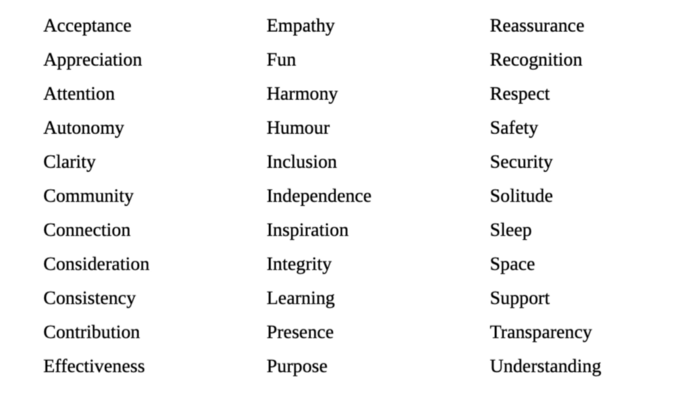Not taking things personally
‘That’s irrational.’
‘That’s stupid.’
‘They’re making things difficult for the sake of it.’
When we encounter emotions and behaviors that don’t make sense to us, it’s often because we don’t have all the information. In the absence of information, we tend to assume the worst.
‘Emotional generosity’ is the ability to see past behaviors that we don’t understand and proactively look for. It’s easy to do this for young children. If they start crying or throwing a tantrum, we wonder whether they are hungry, or tired, or hurt. Sadly, it’s harder to do this for adults.
And yet a more generous interpretation of their difficult behavior often ends up being right.
1. Overreaction is Often Driven by Something Else Entirely
They shout and cry… over an innocent mistake. ‘Has this person lost the plot?’
Overreaction is often a sign that something else might be going on that you aren’t aware of. Perhaps they didn’t get enough sleep or recently had a fight with a friend.
When you notice someone overreacting, broaden your focus and get curious about what else might be going on.
2. Blame is Often Driven by Anger
They point the finger at their colleagues… but it’s their own targets they missed. ‘Is this person blind to their own role in the situation?’
Blame is a way of venting anger. The brain has a knack for redirecting negative emotions outwards. It’s a trap that can prevent us from taking responsibility and holding others accountable.
When you notice someone blaming others for their problems, help that person to label their underlying emotions.
Some studies have shown that it takes about 90 seconds for negative emotions to dissipate — and often when the anger subsides, the arguments change too.
3. Anxiety is Often Driven by A Lack of Visibility
They worry so much… that it makes everyone else worry too. ‘Don’t they have faith in their team?’
Anxiety is a feeling of unease or nervousness, usually about a particular event or situation with an unknown outcome — and it can be contagious.
Anxiety comes from not seeing the full picture.
Thoughts can be hard to organize when they’re bouncing around your head, It is recommended to write your thoughts down. This makes them more tangible and easier to inspect and organize.
4. Avoidance is Often Driven by Insecurity
They put it off or make light of it… but they know how important it is. ‘Don’t they even care?’
Avoidance and anxiety are both ways of expressing insecurity. Avoidance is often a defense mechanism against painful feelings, such as the fear of failure or rejection.
5. Criticism is Often Driven by Shame
They criticize other people’s work… even when it’s not really an issue. ‘Do they get a kick from putting people down?’
In Daring Greatly, Brene Brown provides a useful insight: ‘Research tells us that we judge people in areas where we’re vulnerable to shame, especially picking on folks who are doing worse than we’re doing.’ Once again, it’s easier to project negative self-talk onto others than deal with it head-on.
When you notice someone criticizing, ask them who helped them when they faced a similar challenge, and how they did it.
6. Unrequested Advice is Often Driven by Regret.
They tell others what to do… even when advice isn’t welcome. ‘Aren’t these people just control freaks?’
Advice is sometimes regret in disguise. Perhaps a past experience has left them with a longing to have acted differently, and this is their chance to put things right and help you avoid the pain they felt.
When you notice someone giving unrequested advice, ask if they’ve been in a similar situation before — and how it went.
7. Mistrust is Often Driven by an Unspoken Expectation
They don’t trust their partner… even when they want to. ‘Do these people just have relationship issues?’
Trust tends to break down when there’s an unspoken perception of the other side not taking responsibility for their behaviors. This perception turns into resentment, which eventually shows up as a lack of trust. And of course, when trust breaks down, so does communication.
8. Doubt is Often Driven by a Lack of Clarity
They can’t make a call… even when they seem to have enough information. ‘Are they incapable of making decisions?’
Doubt arises when outcomes are uncertain. However, if you’re waiting for certainty you’ll wait forever. Clarifying what matters can help others overcome paralyzing doubt and make bolder decisions.
9. Selflessness is Often Driven by Guilt
They say yes to everything… even when it’s not good for them. ‘Are they trying to make us look bad?’
Acts of selflessness may not seem like bad behaviors. Working around the clock and sacrificing your own needs for others can seem like commitment and diligence.
However, prolonged selflessness often masks a sense of unworthiness; if you believe you don’t deserve to have your own needs met, you focus on the needs of others instead. And eventually this can lead to resentment, fatigue, and burnout.
10. Every Negative Emotion is Driven by an Unmet Need
They’re negative… even when there’s a lot to celebrate. ‘Are they just an energy sucker?’
In Marshall Rosenberg’s book Nonviolent Communication, he explains that every negative emotion is the result of an unmet need.
However, few of us actually know how to put that need into words.
Here’s a list of commonly unmet universal needs at work:

Conclusion
These points can help you expand your ability to reinterpret bad behaviours with generosity. Ask yourself, What else might be going on here?, Then listen carefully and stay curious.
Helping people be heard can reduce the negative emotions that led to their behaviours in the first place. When it comes to emotional reactions, listening might just be the best medicine.
At the same time, being generous doesn’t mean ‘taking one for the team’. If other people’s behaviours affect your wellbeing, it’s time to set some boundaries.